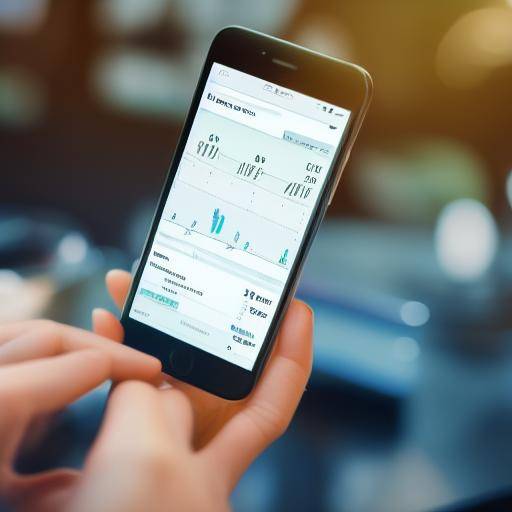
In the current digital era, financial technology has revolutionized the way we manage our personal finances. Finance apps have become essential tools for managing spending, budgeting, investing smartly and planning the financial future. In this article, we will explore the best personal finance apps available on the market, as well as financial technology and finance management in general.
Introduction
At present, the management of personal finances has evolved significantly with the proliferation of apps designed to facilitate financial control and planning. From day-to-day spending management to automated investment, these tools offer innovative solutions that promote the financial health of users. In this article, we will address in detail the best personal finance apps, exploring both their features and their contribution to financial technology and finance management. We will also provide practical advice, in-depth analysis and a vision of the future on the impact of these applications on everyday life.
History and Background
The first manifestations of financial technology date back to the 1950s, when the first computer systems began to revolutionize the financial sector. With the advance of computer science and internet development, the possibilities for managing personal finances increased. The evolution of finance apps has been a natural consequence of this trend, allowing users to access sophisticated tools from the comfort of their mobile devices.
The Surgment of Finance Apps
The first personal finance apps appeared early in the new millennium, offering basic features such as cost tracking and budget creation. Over time, these applications have evolved to include more advanced features such as predictive analysis, automated financial advice and personalized investment services.
Financial Technology and Digital Transformation
The emergence of financial technology has revolutionized the way we interact with money. From the use of algorithms to offer personalized investment tips to the implementation of safe and efficient payment systems, the fintech has been instrumental in democratizing access to previously reserved financial services to an elite.
Analysis in Deep
The adoption of personal finance apps has generated a significant impact on how people manage their money. These platforms offer a number of benefits, including streamlining financial tasks, improving decision-making and promoting long-term savings. However, they also pose challenges, such as data privacy and confidence in algorithm-based decisions.
Benefits of Personal Finance Apps
Personal finance apps offer a range of practical benefits, including:
- Cost control: Facilitate detailed monitoring of expenditures, allowing us to identify consumption patterns and optimization areas.
- Finance Automation: Help automate tasks such as billing and transfer to savings accounts, simplifying daily financial management.
- Data visualization: They present the financial information clearly and visually, which facilitates the understanding of the personal economic situation.
- Personalized advice: Some apps offer financial advice based on algorithms and predictive analysis, adapted to individual needs.
Current Challenges and Trends
As personal finance apps continue to evolve, major challenges and trends arise:
- Data Security: The protection of personal financial information is a growing concern, especially in a digital environment.
- Emphasis on Financial Education: Apps are incorporating educational resources to empower users in informed financial decision-making, from savings tips to investment guides.
- Integration with Other Financial Services: There is a movement towards deeper integrations with financial services, allowing users to make transactions and manage investments directly from apps.
- Innovation in Payments and Transfers: The simplification of payments and transfers, together with the introduction of technologies such as blockchain, is transforming the way we handle daily financial transactions.
Comprehensive review
In evaluating personal finance apps, it is essential to consider not only the features offered, but also their applicability in everyday life. In addition, it is important to understand how these tools affect and improve the overall management of personal finances.
Applications and Best Practices
Some of the most outstanding applications include:
- Mint: It offers a complete overview of finances with cost tracking, personalized budgets and financial advice.
- YNAB (You Need A Budget): Promotes a priority-based budget mentality, facilitating conscious financial decision-making.
- Staff Capital: Combines asset tracking, budgets and retirement planning on a single platform, providing a holistic view of the financial situation.
Expert Perspectives and Futures
To provide a more comprehensive view, it is essential to incorporate the perspectives of experts on personal finance. Some of the key aspects that experts focus on include:
- Automation and Optimization: The trend towards the automation of financial tasks and the optimization of investments becomes increasingly relevant.
- Advanced Analysis Tools: The incorporation of predictive analysis and advanced financial management tools is redefining how people manage their finances.
Comparative analysis
By comparing finance apps with traditional financial management, it is clear that these tools offer a number of advantages in terms of ease of use, accessibility and advanced features. The digitalization of financial management has led to greater transparency and control, giving users a level of empowerment that was previously unattainable.
Synergies and Differences
Compared to traditional financial management, personal finance apps stand out for:
- Accessibility and Comfort: Being available on mobile devices, apps allow instant and ubiquitous access to financial information.
- Predictive Analysis: The apps use advanced algorithms and analyses to provide customized recommendations, something that traditional financial management cannot provide on the same scale.
Practical Tips and Recommendations
By using personal finance apps, it is essential to follow certain principles that maximize their effectiveness and benefits. Some practical tips include:
- Maintain Regularity: Registering expenses and financial updates regularly ensures accurate and useful data.
- Establish Targets Claras: Defining clear financial goals helps to use apps more effectively to achieve long-term financial ambitions.
- Taking advantage of the Advanced Functions: Many apps offer advanced tools such as predictive analysis and financial planning, which can optimize financial decision-making.
Ideas of Experts and Sector Trends
Understanding the future orientation of the financial sector is crucial to maximizing the available tools. With the input of experts and the observation of current trends, it is possible to anticipate some future directions of the use of personal finance apps.
Futures and Emerging Trends Implications
Some emerging trends and future implications include:
- Increased integration with financial services: More convergence is expected between finance apps and traditional banking services, offering users a unified financial experience.
- Focus on Financial Sustainability: Apps could include specific tools and tips to promote financial sustainability, promoting responsible and conscious decisions.
- Advanced customization: Advances in artificial intelligence and data analysis will allow for deeper customization, adapting financial recommendations to the individual situation of each user.
Conclusion
Personal finance apps have transformed the way we manage our finances, providing access to powerful tools that were previously reserved for financial professionals. As financial technology and finance management continue to evolve, these applications will continue to play a key role in promoting financial health and informed decision-making. It is essential to maximize these tools, understand their benefits and challenge their limitations to ensure that they contribute positively to our overall financial stability and well-being.
Frequently asked questions (FAQs)
What are the best personal finance apps available today?
The best apps include Mint, YNAB, Personal Capital, PocketGuard, among others, each with its distinctive features and specific approaches to personal financial management.
How can I choose the best personal finance app for my needs?
When selecting a finance app, it is essential to consider your financial goals, the type of features you need and the ease of use of the app. Performing detailed research and testing different options can help you find the best option for you.
Are personal finance apps secure in terms of data protection?
Personal finance applications often use advanced security measures to protect financial and personal information. However, it is crucial to research and select applications from reliable sources and use secure passwords to ensure the security of your data.
What is the role of financial education in the use of personal finance apps?
Financial education plays a crucial role in using personal finance applications, as it allows you to properly understand and evaluate the information provided by the app, make informed financial decisions and maximize the benefits of the tool.
How can personal finance apps adapt to changes or unforeseen in a user's financial situation?
Personal finance apps typically provide the ability to adjust and re-evaluate budgets, savings targets and investments in response to unexpected financial changes, providing flexibility and control.
What is the future of personal finance apps in the field of personal financial management?
The future of personal finance apps promises greater integration with traditional financial services, a focus on financial sustainability and advanced customization based on data analysis and individual preferences.
With the rapid evolution of financial technology and the growing demand for financial control, personal finance apps continue to position themselves as fundamental allies in managing our personal finances. Staying informed and making the most of these tools will ensure better financial decision-making and greater long-term economic stability.

